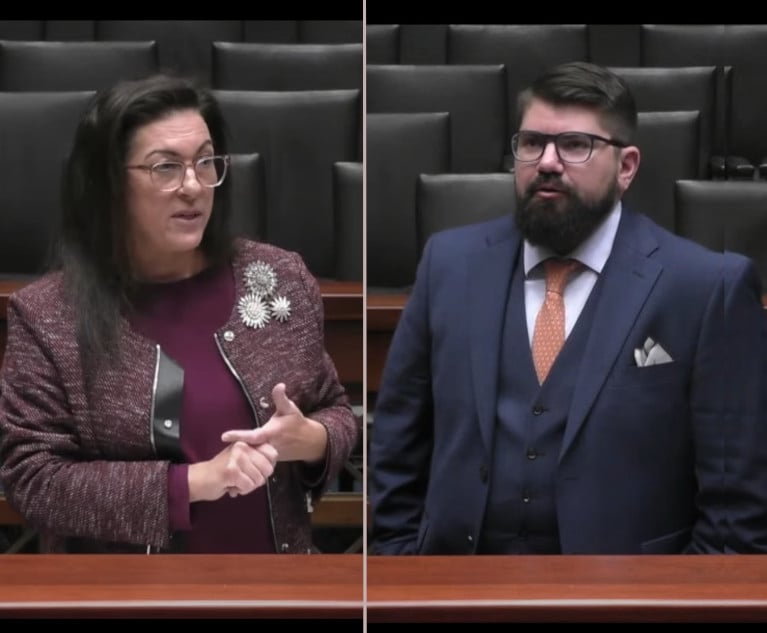Mid-Employment Noncompetes and Confidentiality Agreements May be Unenforceable
Since the Texas Supreme Court's opinion in Light v. Centel Cellular Co., courts have struggled to assess in a consistent manner whether a noncompete, executed in connection with an at-will employment relationship, is "ancillary to an otherwise enforceable agreement" under the Texas Business and Commerce Code.
September 29, 2017 at 01:00 PM
5 minute read
Ever since the Texas Supreme Court's confusing 1994 opinion in Light v. Centel Cellular Co., courts have struggled to assess in a coherent and consistent manner whether a noncompete, executed in connection with an at-will employment relationship, is “ancillary to an otherwise enforceable agreement” under the Texas Business and Commerce Code. Thankfully, over time, the court has refined the threshold test for enforceability of noncompetes.
But what about the threshold enforceability of noncompetes and confidentiality agreements that are executed in the middle of an employment relationship? This article addresses the state of the law on these agreements and how employers can bolster the enforceability of these agreements.
|The Threshold Enforceability
In Light v. Centel Cellular Co., the Texas Supreme Court addressed, for the first time, the enforceability of noncompetes in the context of at-will employment relationships. The court held, in an overly complicated and obtuse test, that an at-will employment relationship may satisfy the prerequisite of an “otherwise enforceable agreement” so long as the “consideration given by the employer in the otherwise enforceable agreement … give[s] rise to the employer's interest in restraining the employee from competing,” and “the covenant must be designed to enforce the employee's consideration or return promise in the otherwise enforceable agreement.” In Alex Sheshunoff Management Services, L.P. v. Johnson in 2006, the court refined its decision from Light and held that an employee's unilateral promise not to disclose the employer's confidential information was an “otherwise enforceable agreement” so long as the employer actually disclosed the confidential information that it had promised to disclose.
This content has been archived. It is available through our partners, LexisNexis® and Bloomberg Law.
To view this content, please continue to their sites.
Not a Lexis Subscriber?
Subscribe Now
Not a Bloomberg Law Subscriber?
Subscribe Now
NOT FOR REPRINT
© 2024 ALM Global, LLC, All Rights Reserved. Request academic re-use from www.copyright.com. All other uses, submit a request to [email protected]. For more information visit Asset & Logo Licensing.
You Might Like
View All
Houston Appeals Court Split Over Race Discrimination Suit Involving COVID-19 Vaccine Distribution
4 minute read
Overtime Rewind: Texas Court Ruling Unravels FLSA Salary Level Increases
4 minute read
'It's Like They Lynched You:' Law Professor's Discrimination Claim Reaches High Court
7 minute readTrending Stories
Who Got The Work
Michael G. Bongiorno, Andrew Scott Dulberg and Elizabeth E. Driscoll from Wilmer Cutler Pickering Hale and Dorr have stepped in to represent Symbotic Inc., an A.I.-enabled technology platform that focuses on increasing supply chain efficiency, and other defendants in a pending shareholder derivative lawsuit. The case, filed Oct. 2 in Massachusetts District Court by the Brown Law Firm on behalf of Stephen Austen, accuses certain officers and directors of misleading investors in regard to Symbotic's potential for margin growth by failing to disclose that the company was not equipped to timely deploy its systems or manage expenses through project delays. The case, assigned to U.S. District Judge Nathaniel M. Gorton, is 1:24-cv-12522, Austen v. Cohen et al.
Who Got The Work
Edmund Polubinski and Marie Killmond of Davis Polk & Wardwell have entered appearances for data platform software development company MongoDB and other defendants in a pending shareholder derivative lawsuit. The action, filed Oct. 7 in New York Southern District Court by the Brown Law Firm, accuses the company's directors and/or officers of falsely expressing confidence in the company’s restructuring of its sales incentive plan and downplaying the severity of decreases in its upfront commitments. The case is 1:24-cv-07594, Roy v. Ittycheria et al.
Who Got The Work
Amy O. Bruchs and Kurt F. Ellison of Michael Best & Friedrich have entered appearances for Epic Systems Corp. in a pending employment discrimination lawsuit. The suit was filed Sept. 7 in Wisconsin Western District Court by Levine Eisberner LLC and Siri & Glimstad on behalf of a project manager who claims that he was wrongfully terminated after applying for a religious exemption to the defendant's COVID-19 vaccine mandate. The case, assigned to U.S. Magistrate Judge Anita Marie Boor, is 3:24-cv-00630, Secker, Nathan v. Epic Systems Corporation.
Who Got The Work
David X. Sullivan, Thomas J. Finn and Gregory A. Hall from McCarter & English have entered appearances for Sunrun Installation Services in a pending civil rights lawsuit. The complaint was filed Sept. 4 in Connecticut District Court by attorney Robert M. Berke on behalf of former employee George Edward Steins, who was arrested and charged with employing an unregistered home improvement salesperson. The complaint alleges that had Sunrun informed the Connecticut Department of Consumer Protection that the plaintiff's employment had ended in 2017 and that he no longer held Sunrun's home improvement contractor license, he would not have been hit with charges, which were dismissed in May 2024. The case, assigned to U.S. District Judge Jeffrey A. Meyer, is 3:24-cv-01423, Steins v. Sunrun, Inc. et al.
Who Got The Work
Greenberg Traurig shareholder Joshua L. Raskin has entered an appearance for boohoo.com UK Ltd. in a pending patent infringement lawsuit. The suit, filed Sept. 3 in Texas Eastern District Court by Rozier Hardt McDonough on behalf of Alto Dynamics, asserts five patents related to an online shopping platform. The case, assigned to U.S. District Judge Rodney Gilstrap, is 2:24-cv-00719, Alto Dynamics, LLC v. boohoo.com UK Limited.
Featured Firms
Law Offices of Gary Martin Hays & Associates, P.C.
(470) 294-1674
Law Offices of Mark E. Salomone
(857) 444-6468
Smith & Hassler
(713) 739-1250







